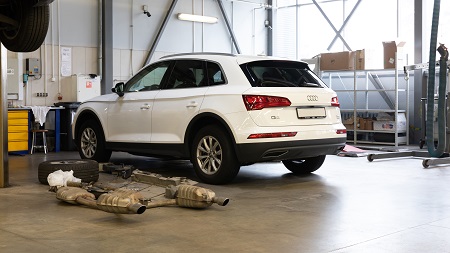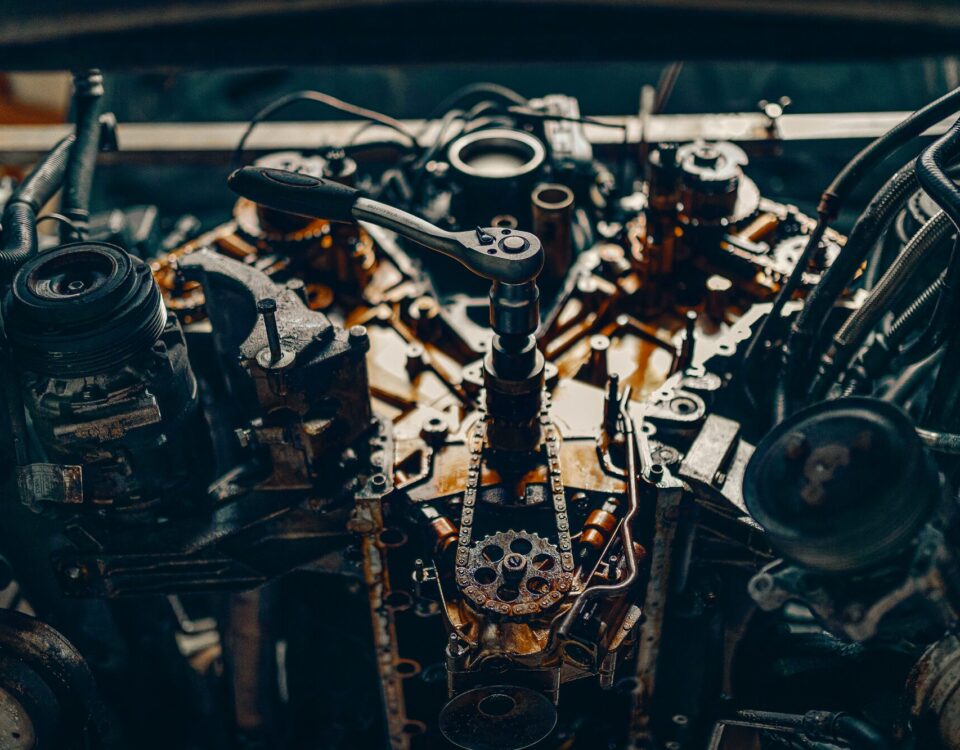
What Maintenance Do Sprinter Vans Need?
December 14, 2023
How to Find a Reliable Mini Cooper Repair Shop in Your Area
February 1, 2024You’ve invested in an Audi, and naturally, you want to keep it running smoothly. But as winter approaches, it’s essential to understand how cold weather impacts your car’s performance and maintenance needs.
From battery life to tire conditions and even your heating and defrost system, there’s a lot to consider. Don’t worry; our Audi mechanic expert tips have got you covered.
Read on to learn about how to effectively maintain your Audi in freezing conditions and ensure top performance.
Understanding the Impact of Low Temperatures on Your Audi
You’re likely to notice a considerable difference in your Audi’s performance when the temperature drops below freezing. This isn’t a flaw in the vehicle’s design but a direct result of how cold weather affects certain components of your car.
For instance, your engine oil thickens in low temperatures, making it harder for your engine to work efficiently. Your battery, too, may struggle to deliver the necessary power since cold conditions can reduce its capacity. Even your tire pressure can be affected, dropping along with the temperature, which can compromise your vehicle’s grip on the road.
To maintain optimal performance, it’s important that you keep a close eye on these areas during winter and take your Audi to an expert mechanic when necessary.
Cold Weather and Its Effect on Your Audi’s Battery Life
Your Audi’s battery life can significantly decrease in cold weather. It’s crucial to monitor it closely to avoid sudden failures. Cold weather reduces the battery’s capacity, while your car’s engine demands more power to start and run efficiently. You might notice slower cranking when you start your car, which is a sign of a weakened battery. Newer model Audi’s need the battery registered to the charging system. If the battery is replaced and not adapted, your vehicle will have near future issues. It is also important to test your charging system as well. Audi uses smart charging systems that can fail causing low or intermittent charging performance.
To maintain optimal performance, regularly check your battery’s charge and health. If you’re experiencing issues, it might be time for a battery change. Remember, it’s not just about starting your car; your battery also powers all electronic components.
How Winter Conditions Affect Your Audi’s Tires, Steering, & Suspension
Driving in winter conditions, you’ll notice that your Audi’s traction and driveability may decrease significantly, making it harder to control the vehicle on icy or snowy roads. The cold weather affects your vehicles handling in several ways:
- Tire Pressure: Cold weather can cause your tires to lose pressure, which affects traction and handling. Regularly check and adjust tire pressure to ensure optimal performance.
- Tire Tread: Snow and ice can fill the grooves in your tire tread, reducing traction. Consider investing in winter tires with specialized tread patterns.
- Rubber Hardness: Tires harden in cold temperatures, decreasing their grip. Winter tires are made with softer rubber compounds to combat this.
- Wheel Alignment: Misaligned wheels can cause poor handling. Regular alignments ensure your Audi performs well in all weather conditions.
- Air Suspension: Audis equipped with dynamic suspension or air suspension may see failure during cold weather. Air suspension compressors often freeze up causing them to seize, and reserve tanks and lines can leak.
- Power Steering: Late model Audi uses electronic power steering motors unlike the conventional hydraulic systems. These steering electronics can freeze, get wet, and fail.
- Traction Control: Traction control and ABS systems can malfunction causing poor traction when stopping and accelerating.
Proper tire maintenance from an Audi mechanic is crucial for safe winter driving.
The Impact of Cold Weather on Your Audi’s Brake System
In cold weather, your Audi’s brake system might act up, and it’s critical to understand why this happens for safe driving.
The fluid in your brake lines can thicken due to low temperatures, especially if there is moisture contamination. This impairs its ability to transmit hydraulic pressure. Consequently, you might experience less responsive braking, which can be quite dangerous in slippery conditions.
Brake boosters and vacuum pump seals as well as pcv seals can harden and leak, causing power brakes to fail. This will cause a stiff brake pedal and make it difficult to stop.
Moreover, snow, ice, and wet road debris can dirty your rotors and calipers, causing corrosion and poor braking. This is common in colder, wetter conditions.
Regular maintenance, including inspections and fluid changes, is essential to ensure your Audi’s brake system is in optimal condition. It’s also advisable to use winter-specific brake fluid during colder months.
Significance of a Properly Functioning Heating & Defrost System in Your Audi During Winter
Just as you’re mindful of your brake system, it’s equally vital to ensure your Audi’s heating system is functioning optimally during winter for both comfort and safety reasons. Poor heating can affect your driving experience as well as safety. Your Air conditioning is also vital. Even though your heat warms you, your A/C system is what drys the air causing your window to defrost. If your A/C system is not working, defrost and visibility will likely become an issue during the wet seasons.
Here are four reasons why:
- Comfort: A well-functioning heating system provides a comfortable environment during cold weather.
- Visibility: It prevents fogging on the windscreen, ensuring clear visibility.
- Vehicle Performance: Proper heating helps to maintain the car’s optimal temperature, allowing anti-freeze to properly circulate through the engine and the vehicle cabins heater core.
- Window Operation: When your vehicle freezes over, window regulators become strained and often become stressed when operated under freezing conditions.
The Role of Antifreeze in Your Audi’s Winter Performance
You’ll find that antifreeze plays a significant role in your Audi’s winter performance by preventing the engine from freezing and corroding. It’s a critical component that maintains the car’s operating temperature during cold conditions. When working properly, it ensures smooth engine performance and prevents damage caused by extreme cold.
It’s essential to maintain the correct antifreeze concentration. Too little may result in freezing, leading to engine damage. Too much can reduce its cooling capacity, causing overheating. Regular checks and top-ups are crucial, especially before winter hits.
Furthermore, it’s pertinent to use the antifreeze recommended by Audi. Other brands may not provide the same level of protection. Make sure you’re familiar with your Audi’s specific needs to maintain optimal winter performance. And make sure your cooling system is properly purged of air bubbles.
Secondary Air Injection System
You may notice your vehicle makes strange noises that develop during colder seasons, especially during start up. One issue you may experience is with your Secondair Air Injection system– a commonly failing Audi component that turns on during cold starts. If the pump is failing, there is a leak in the system or another issue. You may hear noise or see a check engine light illuminate. It is important to have an experienced Audi technician perform diagnosis on your Audi.
Regular Maintenance Tips for Your Audi in Cold Weather

Cold weather can be tough on your Audi, but with routine maintenance like tire pressure checks and oil changes, you’ll keep it running smoothly all winter long. These simple tasks can significantly lessen the impact of freezing temperatures on your vehicle’s performance.
- Check your tire pressure regularly. Cold air can decrease tire pressure, affecting your car’s handling and fuel efficiency.
- Change your oil at the recommended intervals. Cold weather thickens oil, making it harder for your engine to start.
- Adjust your engine oil viscosity based on climate.
- Keep your gas tank at least half full to prevent condensation from forming, which can lead to rust or engine issues.
- Regularly inspect your Audi’s battery. Cold weather can reduce its lifespan and performance.
- Listen for unusual sounds during cold starts, such as ticking or humming sounds. Have your vehicle inspected asap if you hear these sounds, which are commonly caused by things such as injunction pump failure, low pressure fuel pump failure, oil circulation, etc.
Bring Your Audi to Steve’s Imports for Winter Maintenance
By bringing your Audi into Steve’s Imports for winter maintenance, you’re ensuring its performance and longevity but also saving yourself from potential breakdowns in the harsh cold.
Our experienced mechanics, with over four decades of hands-on experience, are adept at diagnosing and addressing Audi-specific problems. From engine and suspension failures to transmission, drivetrain, and electrical issues, we’ve got you covered.
Our Audi repair shop’s expertise extends to cooling systems as well, which is essential for those frosty winter days. We understand the intricacies of German engineering and provide precise, efficient service, be it for a classic Audi 80 or the latest A8 model.
Trust Steve’s Imports and we’ll keep your Audi performing at its peak, no matter the weather.
Contact us today for exceptional customer service and peace of mind.
Quality services our auto shop provides to Audi owners:
- Preventative Maintenance Services
- Check Engine Light Diagnosis
- Fuel System Repair
- Transmission Repair
- Brake Repairs
- Tire Rotation
- Engine Repairs
- Wiring Damage Repair
- And More
Visit our About Us page for more information about our auto repair shop.


